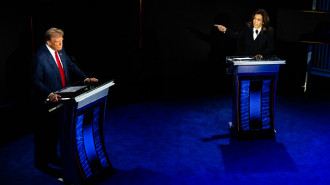New Zealand mosque 'mass murderer' officially charged with terrorism
New Zealand police charged a man accused of killing 51 people in a devastating attack on two Christchurch mosques in March with terrorism on Tuesday.
Brenton Harrison Tarrant, a 28-year-old Australian citizen, was already facing murder and attempted murder charges over the 15 March shootings.
New Zealand Prime Minister Jacinda Ardern, praised by many for her response to the massacre, has from the outset described the attacks as terrorism.
The new terrorism charge comes with a maximum penalty of life imprisonment upon conviction.
It will be a test case for New Zealand's terrorism laws, which were enacted following the 9/11 attacks but has not been used to prosecute any individual in the past.
The New Zealand law defines terrorism as including acts that are carried out to advance an ideological, political or religious cause with the intention of inspiring terror in a civilian population.
Just before the massacre, Tarrant emailed Ardern and others a manifesto detailing his plans for the shootings and his white supremacist ideology.
Tarrant was last month ordered by a judge to undergo mental health assessments to determine whether he is fit to stand trial.
It is expected that those mental health findings will determine whether he is require to enter a plea at his next court hearing, scheduled for 14 June.
Police also said on Tuesday that they had handed Tarrant an additional murder charge, following the death in hospital earlier this month of a Turkish man wounded in the attack.
The number of attempted murder charges against Tarrant was also increased from 39 to 40.
In addition to the 51 people from across the world who were killed in the attack, at least 47 others were treated at hospitals for gunshot wounds.
The police will not offer any further comments on the charges until court proceedings begin, Police Commissioner Mike Bush said in a statement according to AP.
"It will cement in people's minds that terrorism has no race or religion," Mohamed Hussein Mostafa, whose father was killed in the attacks, told Reuters. "I'm happy that he will be made an example of... so that such an atrocity may never happen again on our shores."

![Palestinians mourned the victims of an Israeli strike on Deir al-Balah [Getty]](/sites/default/files/styles/image_684x385/public/2024-11/GettyImages-2182362043.jpg?h=199d8c1f&itok=xSHZFbmc)


![The law could be enforced against teachers without prior notice [Getty]](/sites/default/files/styles/image_684x385/public/2178740715.jpeg?h=a5f2f23a&itok=hnqrCS4x)
 Follow the Middle East's top stories in English at The New Arab on Google News
Follow the Middle East's top stories in English at The New Arab on Google News

![Voters in Michigan [Getty]](/sites/default/files/styles/image_330x185/public/2182490468.jpeg?h=a5f2f23a&itok=XMi_sWGX)
